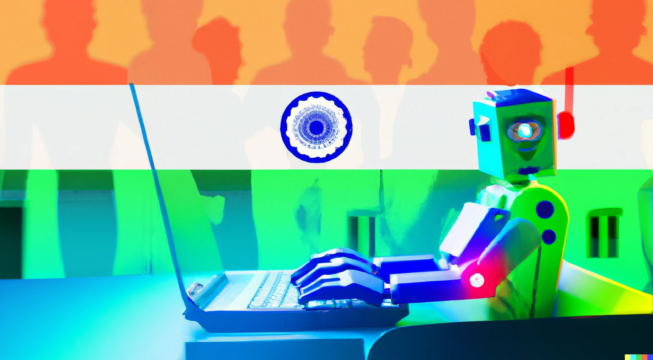IT professionals often grapple with repetitive tasks, software testing, data cleaning, or system maintenance. Generative AI swoops in, automating these chores with precision. Suddenly, developers have more time to focus on creativity, problem-solving, and strategic thinking. Gen AI’s impact on IT is profound.
Recently, we find many IT companies adopting Gen AI. In its latest quarter, Accenture reported a revenue of $15.8 billion and US$21.6 billion in new bookings, showcasing robust Gen AI growth and investments. The company accumulated $1.05 billion in Gen AI projects in the last two quarters. Genpact reported a 4% increase in Q1 2024 revenues to $1.13 billion, with substantial execution increases in data, Gen AI, and digital operations. TCS reported GenAI deals to the tune of $900 million in Q4 FY24. Other Indian IT firms like Wipro, Infosys, LTIMindtree, and HCLTech, are also following the GenAI path.
Read more: Skilling & upskilling in AI & ML amid fears of job loss and talent shortage
As per an AIM Research report, the total market for generative AI is expected to grow at a compound annual growth rate (CAGR) of 40.22% from 2023 to 2033. Furthermore, companies in the services sector are anticipated to experience a slightly higher CAGR of 45%, indicating a faster expansion compared to the overall market.
These companies are investing in Gen AI talents as well. Recently, Reliance Jio backed TWO launched a family of models called SUTRA. These cost-efficient, multilingual generative AI models excel in 50+ languages, offering speech, search, and visual processing capabilities.
In April, IWill, an AI and digital health startup from India received fresh funding from Microsoft’s ‘AI for Accessibility’ program to accelerate IWill GITA, the world’s first controlled Generative AI mental health companion in Hindi. In 2022, Microsoft had funded IWill under the same program to accelerate and enable the development of IWill GITA in Hindi.
Ranjit Tinaikar, Chief Executive Officer and Board Member at Ness Digital Engineering, a lifecycle digital engineering firm offering digital advisory through scaled engineering services, told The Tech Panda that while Gen AI improves productivity for both junior and senior engineers, the happiness of engineers is affected in very different ways by Gen AI, depending on their seniority.

Junior engineers just felt like they got access to new technology, just felt more motivated and wanting to learn it. But the senior people now had more time to spare, to do some real problem solving and engage their team members. They had more time to design the board and think about the board as opposed to just going and coding because a lot of that manual work is being automated
Ranjit Tinaikar, Chief Executive Officer and Board Member at Ness Digital Engineering
“Junior engineers just felt like they got access to new technology, just felt more motivated and wanting to learn it. But the senior people now had more time to spare, to do some real problem solving and engage their team members. They had more time to design the board and think about the board as opposed to just going and coding because a lot of that manual work is being automated,” he explains.
He states that Gen AI impacts tech services companies in two ways, demand and supply.
“On the one hand, it improves the productivity of the supply that we provide, which is our engineering talent. And on the other hand, it increases the demand for more Gen AI based applications and use cases. So, in some ways it effects both supply and demand.”
On the one hand, it improves the productivity of the supply that we provide, which is our engineering talent. And on the other hand, it increases the demand for more Gen AI based applications and use cases. So, in some ways it effects both supply and demand
Ness did some research on how Gen AI affects software engineering productivity. Ness has been measuring productivity of all its engineers, long before Gen AI came on the scene, and hence has tons data on productivity.
“We ran experiments saying, if you use Gen AI, how does the productivity get impacted?” says Tinaikar, and Ness found some interesting insights from the research.
“With software, with use of Gen AI, both junior and senior engineers have improved productivity, but the productivity gap increases between junior and senior engineers in the sense that junior engineers will have lesser productivity improvement then senior product engineers. This could potentially change the traditional pyramid of the IT services company,” he says.
He adds that applying Gen AI in complex environments isn’t good enough yet. “In very complex environments, Gen AI tools have not yet learned enough to give you productivity advantage. The complexity of the software development environment does not affect the productivity gains you get. You get the same productivity gain no matter whether it’s high.”
In very complex environments, Gen AI tools have not yet learned enough to give you productivity advantage
He says Gen AI is still better for maintenance tasks. “We found that for more maintenance oriented tasks, you get more productivity gains than from the new development tasks.”
On the demand side, Ness found that everybody is going for the no regrets quick wave, which is customer interactions using chatbots for call centre automation or customer engagement management. Basically, low risk.
“That’s probably the first basic use case that we are seeing. These are relatively low risk users of Gen AI on the demand side, and we are seeing a lot of that. But now what we are seeing is that increasingly people are going to the next phase, which is, ‘Hey, let’s use Gen AI for improving fraud management, or anti money laundering’.”
These are relatively low risk users of Gen AI on the demand side, and we are seeing a lot of that. But now what we are seeing is that increasingly people are going to the next phase, which is, ‘Hey, let’s use Gen AI for improving fraud management, or anti money laundering’
He states that Gen AI is yet to see mission critical tasks.
“What we are definitely not seeing just yet is using Gen AI for mission critical and high risk scenarios. You’re not going to use Gen AI for automated monitoring of a nuclear reactor, or for sending a rocket to the space or for airplane flight control.
“Those are high risk mission critical scenarios where people are still very unsure. And most importantly, there is a strong regulatory and legal set of rules and policies that need to be defined before people start using it in those high-risk situations,” he explains.
Generative AI can churn out code snippets, templates, and even entire applications. But it will take a while to completely depend on it. For now, it’s definitely saving man hours for the IT.












